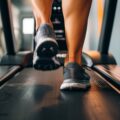Focus on Quality over Quantity
Training with a pro triathlete showed me that it’s quality over quantity when it comes to workouts. I used to think more miles or minutes was better, but they emphasized doing each workout with good form and full effort. This prevents injury and helps you improve faster.
Listen to Your Body
It’s important to push yourself during workouts, but also crucial to listen to feedback from your body. If you feel pain or excessive fatigue, take it as a sign to back off or take a rest day. Pushing through can lead to overtraining or burnout.
Fuel and Recover Properly
Proper nutrition and rest are just as vital as training. Fuel with nutrient-dense whole foods, emphasize carb-loading before long workouts, and get adequate sleep each night. Active recovery days are also key for muscle repair and adaptation.
Set Process-Based Goals
Outcomes like race times or weights lifted are less in our control than the process it takes to get there. Focusing on process allows for more self-compassion. Examples are getting 8 hours of sleep or perfect form during each rep.
Enjoy the Process
Working out at an elite level requires immense discipline, but the pros also know how to have fun. This may mean going on training rides with friends or putting on energizing music. Enjoying the process makes fitness sustainable.
Frequently Asked Questions
What should a beginner focus on with fitness?
As a beginner, focus on building consistency with workouts, even if that means starting small with just 20-30 minutes per day. Learn proper form to prevent injury. Work on listening to your body and enjoying the process.
How often should you take rest days?
Most experts recommend 1-2 rest days per week for adequate recovery, especially when training hard. You may need more when first starting an exercise program. Schedule rest days intentionally and use them for active recovery.
What foods help with workout recovery?
Some great recovery foods are eggs, leafy greens, sweet potatoes, fatty fish, berries, yogurt and nut butters. Aim for a mix of high-quality protein, complex carbs and anti-inflammatory fats after tough workouts.
Is overtraining a myth?
Overtraining is real for serious athletes. Signs include persistent fatigue, performance decline, insomnia, depression and frequent illness. Taking adequate rest days, not underfueling, managing life stresses and varying workouts can help prevent it.
How can you make exercise more enjoyable?
Working out with friends, listening to music you like, being outdoors, tracking progress, trying new activities periodically, and focusing on how working out makes you feel rather than how many calories you burn can all make fitness more fun.









